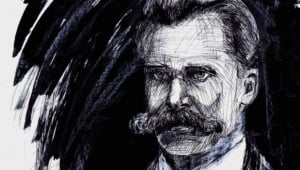Friedrich Nietzsche: 123 Best Quotes & 3 Theses

Friedrich Nietzsche was a renowned German philosopher. But during his lifetime, his theories and works were less well received. You can find here the most influential theses of the famous German philosopher, as well as his most popular and thought-provoking quotes, right here.
Genius and madness often lie close together; Aristotle linked the two when he said, “There is no great genius without a touch of madness.” The life of Nietzsche (1844 to 1900) was no different, and likewise marked by both.
His writings were revolutionary and had a significant influence on philosophy. But illness and depression troubled him time and again and ultimately caused his downfall.
Famous Friedrich Nietzsche Quotes

Famous Friedrich Nietzsche Quotes
The anthropologist and philosopher published many of his well-known theses in a wide variety of works. Among the most famous of his publications are “The Joyful Wisdom” and “Thus Spoke Zarathustra”.
In this chapter, we have compiled the best and most popular quotes by Nietzsche, with which you too will certainly be able to identify.
Here you’ll find more quotes from famous authors.
Wisdoms of Nietzsche

Wisdoms of Nietzsche
Considered to be one of the most influential philosophers in world history, Nietzsche has enriched our lives with many beautiful words of wisdom that are still relevant today. Let the following aphorisms inspire you, and write them down for those days when you lack motivation or good humor.
You can also share one with your sister or Bestie, who might just turn into fans of Nietzsche’s wisdom themselves. These aphorisms can teach us newfound perspectives on ourselves and live, and form a valuable part of Nietzsche’s collection.
- Without music, life would be a mistake.
- However, my belief is that you can really only thrive among like-minded, like-spirited people.
- If one has no luck, one should acquire luck.
- He who should learn to fly one day must first learn to stand and walk and run and dance; one cannot fly into flying.
- Talking much about oneself can also be a means to conceal oneself.
- Whoever knows he is deep, strives for clarity; whoever would like to appear deep to the crowd, strives for obscurity.
- A politician divides mankind into two classes: tools and enemies.
- Tolerance is a proof of distrust in one’s own ideals
- He who has a why to live for can bear almost any how.
- He who cannot obey himself will be commanded.
- You have your way. I have my way. As for the right way, the correct way, it does not exist.
- Some are made modest by great praise, others insolent.
- Some do not find their heart until they lose their mind.
- This – is now my way – where is yours? Thus did I answer those who asked me “the way.” For the way- it does not exist!”
- To the mediocre, mediocrity is a form of happiness.
- Whoever fights monsters should see to it that in the process he does not become a monster.
- The mother of excess is not joy, but joylessness.
- In everything one thing is impossible: rationality.
- There are no facts, only interpretations.
- Partial knowledge is more triumphant than complete knowledge; it takes things to be simpler than they are, and so makes its theory more popular and convincing.
- The secret of reaping the greatest fruitfulness and the greatest enjoyment from life is to live dangerously.
- The individual has always had to struggle to keep from being overwhelmed by the tribe.
- The best way to begin each day well is to think upon awakening whether we could not give at least one person pleasure on this day.
- Free will without fate is no more conceivable than spirit without matter, good without evil.
- Man is a rope stretched between the animal and the Übermensch – a rope over an abyss.
- You have made your way from worm to man, and much in you is still worm.
- One does not kill by anger but by laughter
- Is life not a thousand times too short for us to bore ourselves?
- One must need to be strong, otherwise one will never become strong.
- The worst things, however, are the petty thoughts.
- Death is not the enemy of life, and it does not mean its end, it only brings life to a beautiful peak.
Best Friedrich Nietzsche Quotes about Love

Best Friedrich Nietzsche Quotes about Love
In Nietzsche’s work “The Gay Science,” the philosopher challenges the romantic notions of erotic love with the assertion that love “is perhaps the most ingenious expression of egoism.”
Moreover, he claims that love is very close to the lust for possessions and greed. Find out what else Nietzsche thought about love in the aphorisms below.
You can always send one of the quotes to your loved one, especially when you are just lacking the right words yourself. These quotes will help you express yourself. We have compiled 16 of Nietzsche’s quotes about love for you below to choose from.
- What is done out of love always happens beyond good and evil.
- Ultimately, it is the desire, not the desired, that we love.
- Love and cruelty are not opposites: they are always found with each other in the best and firmest natures.
- Sensuality often hastens the “Growth of Love” so much that the roots remain weak and are easily torn up.
- One man runs to his neighbor because he is looking for himself, and another because he wants to lose himself.
- The spiritualization of sensuality is called love.
- My impatient love overfloweth in streams,- down towards sunrise and sunset. Out of silent mountains and storms of affliction, rusheth my soul into the valleys.
- The fire of love glows in the names of all the virtues, and the fire of wrath.
- A testimony of love. Somebody said: “About two persons I have never reflected very thoroughly: that is the testimony of my love for them.”
- True, we love life, not because we are used to living but because we are used to loving.
- Surrounded by the flames of jealousy, the jealous one winds up, like the scorpion, turning the poisoned sting against himself.
- But by my love and hope I beseech you: do not throw away the hero in your soul! Keep sacred your highest hope!
- And also beware of the fits of your love! The lonely one offers his hand too quickly to whomever he encounters.
- What is love but understanding and rejoicing that another lives, works and feels in a different and opposite way to ourselves? That love may be able to bridge over the contrasts by joys, we must not remove or deny those contrasts. — Even self-love contains the unmixable duality (or multiplicity) in a person as a prerequisite.
- There is always some madness in love. But there is also always some reason in madness.
- Love is more afraid of change than destruction.
Famous Nietzsche Quotes

Famous Nietzsche Quotes
In spite of his not very easy reading in terms of content, Nietzsche has left us many valuable and insightful quotes. Read them and let them inspire you to take your life into your own hands, to accept your mistakes, and to become the person you actually want to be.
You can also use them to inspire friends or family members, who could do with a little encouragement in life. Just send them via WhatsApp or share them on social media with them. These famous quotes are guaranteed to get you thinking, and are the most well known of Nietzsche’s aphorisms.
- Whoever does not have two-thirds of his day for himself, is a slave.
- The good questioner is already half answered.
- New paths are created by walking them.
- Hope is the rainbow over the rushing stream of life.
- We are so fond of being out in Nature because it has no opinions of us
- Blessed are the forgetful, for they get the better even of their blunders.
- It’s not a lack of love, but a lack of friendship that makes unhappy marriages.
- And if you gaze long into an abyss, the abyss also gazes into you.
- If you have had great joy in something, say goodbye! It never comes a second time.
- That which does not kill us makes us stronger.
- Convictions are more dangerous foes of truth than lies.
- To live alone one must be an animal or a god – says Aristotle. There is yet a third case: one must be both – a philosopher.
- Forgetfulness is a property of all action
- Become who you are.
- One must have chaos in oneself to give birth to a dancing star.
- And those who were seen dancing were thought to be insane by those who could not hear the music.
- To every soul belongs another world.
- There is no beautiful surface without a terrible depth.
- Our shortcomings are the eyes with which we see the ideal.
- The man of knowledge must be able not only to love his enemies but also to hate his friends.
Nietzsche Quotes about Humans

Nietzsche Quotes about Humans
Friedrich Nietzsche’s thoughts on human nature are still a major topic of discussion among philosophers today. For example, Nietzsche believed – unlike most world religions and scholars of his time – that man does not stand at the pinnacle of creation.
Rather, he viewed man as an animal that has become detached from his instincts and refers to him as the sickest species that has ever lived in the world.
He believed that humanity was in a transitional stage, and has not reached the final stage of development yet. Although Nietzsche himself was a semantic Nihilist, he does define a so-called Übermensch, who determines and follows his own laws and standards, rather than to define himself to religion or law.
He even dedicated a number of aphorisms to what he considered to be a higher being, the Übermensch, for example: “Man is a rope, fastened between animal and Übermensch — a rope over an abyss.”
- There are two different types of people in the world, those who want to know, and those who want to believe.
- He who seeks intelligence lacks intelligence.
- Solitude makes us tougher towards ourselves and tenderer towards others. In both ways it improves our character.
- The most fundamental form of human stupidity is forgetting what we were trying to do in the first place.
- The man is a mediocre egoist: even the smartest takes his habit more important than his own advantage.
- For many men do not have those moments at all, and are themselves intervals and intermissions in the symphony of real life.
- A man of genius is unbearable, unless he possesses at least two things beside: gratitude and purity.
- Man is something to be overcome.
- Distrust all people with a strong drive to punish.
- Man suffers so deeply that he had to invent laughter. The unfortunate and melancholic animal is, of course, the most cheerful.
- The abdomen is the reason why man does not readily take himself to be a god.
- The weak and ill-constituted shall perish: first principle of our philanthropy. And one shall help them to do so.
- He who has much joy must be a good man: but perhaps he is not the wisest, though he achieves just what the wisest strives for with all his cleverness.
- The sick are the greatest danger for the healthy; it is not from the strongest that harm comes, but from the weakest.
- One begins to distrust very clever persons when they become embarrassed.
- Whoever lives for the sake of combating an enemy has an interest in the enemy’s staying alive.
- The man who does not wish to belong to the mass needs only to cease taking himself easily; let him follow his conscience, which calls to him: “Be yourself!”
- He who seeks may easily get lost himself.
- Most people are far too much occupied with themselves to be malicious.
- When feeling hatred, women are more dangerous than men.
- And he who would not languish among men, must learn to drink out of all glasses; and he who would keep clean among men, must know how to wash himself even with dirty water.
- But the worst enemy you can meet will always be yourself; you lie in wait for yourself in caverns and forests.
Friedrich Nietzsche Quotes about Religion

Friedrich Nietzsche Quotes about Religion
As an anthropologist, Nietzsche dealt extensively with religion, especially Christianity. For example, Nietzsche never believed in the existence of God and accused Christianity of inventing concepts such as “afterlife,” “sins,” and “salvation” only to question and devalue the here and now.
Friedrich Nietzsche, being somewhat of an atheist himself, considers Christianity to be slave morality and made up of illusory ideal worlds. He is well known for his highly controversial aphorism: “God is dead. God remains dead.
And we have killed him” to which the church responded with “Nietzsche is dead – the church is alive.” The following quotations make Nietzsche’s opinion about religion clear once again, and might just inspire you to think about the subject in detail, too.
- One should not go to churches if one wants to breathe pure air.
- The word “Christianity” is already a misunderstanding – in reality there has been only one Christian, and he died on the Cross.
- Nobody is free to become a Christian: one is not “converted” to Christianity — one has to be sick enough for it.
- “Faith”: not wanting to know what is true.
- I condemn Christianity; I bring against the Christian church the most terrible of all the accusations that an accuser has ever had in his mouth. It is, to me, the greatest of all imaginable corruptions; it seeks to work the ultimate corruption, the worst possible corruption.
- In every religion the religious man is an exception.
- As soon as a religion comes to dominate it has as its opponents all those who would have been its first disciples.
- A religious man thinks only of himself.
- So we have as a misunderstanding … an ecclesiastical order, with priesthood, theology, cultus, sacraments; in short, everything that Jesus of Nazareth had opposed.
- I cannot believe in a God who wants to be praised all the time.
Here you’ll find more smart quotes to think about.
More Friedrich Nietzsche Quotes about Life

More Friedrich Nietzsche Quotes about Life
Nietzsche published fifteen books during his lifetime, his first published work being “The Birth of Tragedy Out of the Spirit of Music”, and his ultimate masterpiece, “Thus Spoke Zarathustra.”, published in 1883.
Among other things, they deal with the struggle against morality, the value of truth and the general consideration of man.
You will certainly notice his undoubted brilliance reflected in the content and style of the following of Nietzsche’s quotations on various topics. They make you look at life differently and are sure to get you pondering.
You can also share them with your Bestie or a family member, who also appreciates Nietzsche’s unquestionable intelligence and writings. If you are brave enough, you might even find a suitable quote for a Nietzsche tattoo here.
- All that is good is light. Everything divine walks on tender feet.
- No price is too high to pay for the privilege of owning yourself.
- The world itself is the will to power – and nothing else!
And you yourself are the will to power – and nothing else! - He who cannot lie does not know what truth is.
- In every real man a child is hidden that wants to play.
- Philosophy is a kind of revenge on reality.
- Many are stubborn about the path once taken, few about the goal.
- But it takes more courage to make an end than to make a new verse: that all physicians and poets know well.
- A profession is the backbone of life.
- Strong hope is a much greater stimulant of life than any single realised joy could be.
- The real world is much smaller than the imaginary.
- But all desire wants eternity / Wants deep, deep eternity!
- Vanity: it is the skin of the soul.
- Women are more sensual than men, but they know less about their sensuality.
- Do not allow yourselves to be deceived: Great Minds are Skeptical.
- A joke is an epigram on the death of a feeling.
- Laughter means: taking a mischievous delight in someone else’s uneasiness, but with a good conscience.
- The poison from which the weaker nature perishes strengthens the strong man – and he does not call it poison.
- I and Me are always two different persons.
- Everything matters. Nothing’s important.
- A nihilist is a man who judges that the real world ought not to be, and that the world as it ought to be does not exist.
- There are no moral phenomena, but only a moral interpretation of phenomena.
- If someone wants to seem to be something, stubbornly and for a long time, he eventually finds it hard to be anything else
- If you try it, you will be lonely often, and sometimes frightened. But no price is too high to pay for the privilege of owning yourself.
Friedrich Nietzsche: His Life

Friedrich Nietzsche: His Life
Friedrich Nietzsche was born on October 15, 1844, near Leipzig. He died in Weimar on August 25, 1900, at the age of only 55. He was active as a professor of philology, a freelance author and a freelance philosopher.
His theories were always controversial, and he gained only a few followers during his lifetime. His late work caused some controversy in the past.
Nietzsche’s theory of the Übermensch was reinterpreted by the National Socialists, among others, for their own purposes. At the same time, Nietzsche clearly distanced himself from anti-Semitism and nationalism during his lifetime. What Nietzsche really meant by his theory of the Übermensch, we will explain in more detail later.
Important influences on Friedrich Nietzsche were the composer Richard Wagner and the German philosopher Arthur Schopenhauer. Nietzsche had deep admiration for Wagner and was also on friendly terms with him for several years.
He later distanced himself from Arthur Schopenhauer’s philosophy. Nietzsche’s works are still relevant in philosophy today and serve as inspiration for modern thinkers.
Short Profile

Short Profile
With the following key data, you will gain a first impression of Nietzsche’s life and can get a rough overview:
- Name: Friedrich Wilhelm Nietzsche
- Lifetime: Born on October 15, 1844, near Leipzig (today’s Saxony-Anhalt); died on August 25, 1900, in Weimar
- Occupations: professor of philology, freelance author, freelance philosopher
- Family: Father: Carl Ludwig Nietzsche (1813-1849); mother: Franziska Nietzsche (1826-1897); siblings: Elisabeth Nietzsche (1846-1935), Karl Ludwig Joseph Nietzsche (1848-1850)
Curriculum Vitae

Curriculum Vitae
Nietzsche repeatedly struggled with some turbulence during the course of his life. Especially his health condition caused difficulties again and again and also meant the end of his scientific career.
In the beginning, Nietzsche was predicted to have a steep career. However, his works were not very well received, also because he moved away from classical philology with them. And, after all, he eventually taught the subject at university.
Today, Friedrich Nietzsche is known mainly as a German philosopher. Although he did not have citizenship at his own request, he wrote in German. We have summarized Nietzsche’s most important intermediate stages in bullet-point form.
1844
- Nietzsche was born in Röcken near Leipzig on October 15
- His father was a Lutheran pastor
1850-1856
- 1850 Death of his father, move to Naumburg
- Life in a female household with mother, sister, grandmother, two unmarried aunts and the maid
- 1856 Moves to own apartment with mother and sister
1864-1869
- 1864 Studies classical philology and Protestant theology at the University of Bonn, drops out of theology studies after one semester
- 1865 Transfer to the University of Leipzig
- 1869 Promotion to associate professor
1872-1879
- 1972 Publication of his first major work, “The Birth of Tragedy Out of the Spirit of Music”.
- 1879 early retirement from teaching due to health problems
1888-1889
- 1888 Improvement of his health and high spirits, publication of several books, began writing his autobiography “Ecce Homo”
- January 3, 1889 nervous breakdown
- Nietzsche stays in several psychiatric clinics
From 1890
- Cared for by his mother and sister respectively in Naumburg and later Weimar, delusions, apathy and strokes
- August 25, 1900, Death by pneumonia and further stroke
Biography of Friedrich Nietzsche
In the following, we go into more detail about the individual stages of Nietzsche’s life. They are subdivided into origin and youth, university years, the transition to philosophy, his activities as an author and his last years in sickness.
Origin and Youth

Biography of Friedrich Nietzsche: Origin and Youth
Friedrich Nietzsche was the eldest child of the Lutheran pastor Carl Ludwig Nietzsche and his wife Franziska Nietzsche. Early on, Nietzsche was exposed to a stroke of fate, as he lost his father when he was only five years old.
From then on, the small family lived with his grandmother, together with two unmarried aunts and a maid. Nietzsche thus grew up in an all-women household, which shaped him throughout his life.
Only with the death of his grandmother in 1856 and the resulting inheritance did Nietzsche move into his own apartment with his mother and sister. Already in his youth, Nietzsche stood out for his special scholastic achievements.
His artistic and linguistic talent was extraordinary. Even in his free time, he occupied himself with the arts and founded the literary-artistic association “Germania” with two school friends, in which they regularly discussed self-penned compositions, poems and writings.
University Years

University Years
In 1864, Nietzsche began studying classical philology (linguistics and literature) and Protestant theology at the University of Bonn. After only one semester, however, he dropped out of his studies. A year later, he transferred to the University of Leipzig, where he attracted attention because of his special talent for languages.
Parallel to his studies, Nietzsche also intensively studied the works of Schopenhauer, in which he found relief and justification for his own pessimism. Schopenhauer established Nietzsche’s love for philosophy, which was to last throughout his entire life.
During his studies, Nietzsche also met the famous composer Richard Wagner and developed a friendship with him over the following few years. Nietzsche was deeply impressed by Wagner’s compositions, and his early work was also significantly influenced by Wagner’s music.
As early as 1869, Nietzsche received an offer to become an associate professor of classical philology at the University of Basel, even though he had not yet earned his doctorate. His special talent in ancient languages was already known and promising beyond the university walls.
Transition to Philosophy

Transition to Philosophy
His first major work, “The Birth of Tragedy Out of the Spirit of Music,” was not well received by critics and was largely rejected. The reason for this is that in this work, Nietzsche turns away from traditional philology and works increasingly with philosophical speculation.
In general, Nietzsche’s interest in philosophy grew, so much so, that he even applied for a philosophical chair, but without success. He also used his time in Basel to cultivate his friendship with Richard Wagner, who also resided in Basel.
In 1876, however, Nietzsche’s and Wagner’s friendship ended. An antagonism even developed between the two intellectuals, which Nietzsche addresses in his late work “Nietzsche contra Wagner.” Around the same time, he also distanced himself from the philosophy of Schopenhauer.
Activity as a Freelance Author
In 1879, Nietzsche left the university due to health reasons and took early retirement. For several years he had already been struggling with migraine, his stomach as well as vision disorders, which finally forced him to give up his activities at the university.
From then on, Nietzsche worked as a freelance author and philosopher. He undertook many extensive journeys, always in search of suitable climatic conditions. Around 1882, he had a fallout with his family and many of his friends, and as a result, was consequently plagued by suicidal thoughts.
These thoughts were further reinforced by his increasingly poor health. His career as a freelance author and philosopher was also not taking off. Thus, his works were partly published only in private print with only a few copies.
In 1888, he reached a high point, published numerous books and began to write his autobiography “Ecce Homo”. In the process, he repeatedly vacillated between delusions of grandeur and depression.
Nietzsche’s influence on posterity is so great that other authors have also been inspired by him.
In some cases, the inspiration goes so far that Nietzsche embodies the protagonist of the fictional plot in the novel “And Nietzsche Wept” (Irvin D. Yalom, 1992), along with the Austrian doctor Josef Breuer and another character.
The novel is about a young Russian woman named Salomé who, together with the doctor Breuer, tries to help the suicidal Nietzsche.
Illness and Death

Illness and Death
In 1889, Nietzsche deliriously wrote letters to his friends and eventually had a nervous breakdown. This was followed by several stays in psychiatric hospitals, where he spent the last years of his life.
This period was marked by delusions, apathy (indifference) and strokes. From 1897 onwards, he was partially paralyzed. His mother died in the same year. In 1900, he died at the age of 55 from yet another stroke and pneumonia.
The Most Important Works

The Most Important Works
In this chapter you will find some of the most important works of Friedrich Nietzsche. His main works are considered to be “Human, All Too Human”, “Thus Spoke Zarathustra” and “Beyond Good and Evil”.
In addition to these works, Nietzsche also wrote aphorisms, philosophical treatises and lyrical works. One of his most famous quotes, “What does not kill me makes me stronger” comes from “Twilight of the Idols.”
His thoughts have an enlightening character and fall chronologically into the literary epochs of realism and naturalism. However, they cannot be compared to typical works of that time, since Nietzsche always thought controversially and was far ahead of his time.
His books fascinate people to this day and are still often the subject of school lessons, philosophy or German studies.
- Human, All Too Human (1878-1879)
- The Gay Science (first published in 1882, supplemented in 1887)
- Thus Spoke Zarathustra: A Book for All and None (1883-1885)
- Beyond Good and Evil: Prelude to a Philosophy of the Future (1886)
- The Case of Wagner: A Musician’s Problem (1888)
- Twilight of the Idols: How to Philosophize with a Hammer (1889)
- The Antichrist: Curse on Christianity (1895)
- Nietzsche contra Wagner (1895)
- Ecce Homo: How One Becomes What One Is (written in 1888, published posthumously in 1908)
Famous Theses of Nietzsche

Famous Theses of Nietzsche
In this chapter we will explain to you three theses of Nietzsche that emerged from his many thoughts about life, people and the world in general.
Among them is the assumption that beautiful things cannot exist without terrible things, that God is dead and people have killed him, and the ideal of the superman.
Beautiful does not exist without terrible
Nietzsche held the thesis that there is nothing beautiful without the terrible.
These thoughts become clear in his quotes:
- “There is no beautiful surface without a terrible depth.” (1870/71)
- “Our defects are the eyes with which we see the ideal.” (1878)
He points out that man measures the beautiful in life by how stark the contrast is with the terrible. Without the comparison, nothing can be beautiful. The more critically we look at our faults and the stronger our shortcomings, the more beautiful the distant ideal seems.
As a metaphorical comparison, you can imagine a flower in the desert. Alone in the withered land, it probably seems more beautiful and special than when you look at a single flower in a green meadow.
God Is Dead

God Is Dead
The famous Nietzsche quote “God is dead” comes from “The Gay Science” (1882/87). With this statement, Friedrich Nietzsche means that the outwardly carried Christian values are only hypocritical.
The full quote reads:
“God is dead. God remains dead. And we have killed him. How shall we comfort ourselves, the murderers of all murderers? What was holiest and mightiest of all that the world has yet owned has bled to death under our knives.”
Man has lost faith in God by his behavior, even if he continues to pretend to live by Christian values. In this quotation of Nietzsche, his nihilistic worldview is once again clear, emphasizing transience and destruction.
The theory of the Übermensch also arises from this belief. According to this theory, man should no longer be guided by his faith and compassion. He should detach himself from it and follow his own will.
Was Nietzsche an Atheist?

Was Nietzsche an Atheist?
Friedrich Nietzsche was neither a typical atheist nor a true believer.
However, he was much concerned with religion and its effects, teachings, and impact on humanity, for example with:
- Ancient Greek gods
- Christianity
- Buddhism
- Hinduism
- Islam
- The Übermensch
Nietzsche’s Theory of the Übermensch

Nietzsche’s Theory of the Übermensch
The Übermensch according to Nietzsche is his ideal conception of a human being. He sees man in the duty to develop himself and to grow beyond himself.
According to Nietzsche’s ideal, man would have to free himself from social constraints, morality, and religion in order to develop independently of them. Thus, he would discard the “human faults” and overcome his weaknesses to become “better”.
The theory of the Übermensch was later used by the National Socialists for their ideal image of the “Arian” and a superhuman race. Nietzsche himself, however, clearly distanced himself from nationalism and anti-Semitism during his lifetime.
From 1869, after his move from Prussia to Basel, he was even stateless at his own request and had no citizenship.
Nietzsche and Nihilism

Nietzsche and Nihilism
Friedrich Nietzsche is also one of the strongest representatives of nihilism. It is characterized by a negative and pessimistic worldview and is reflected in many of Nietzsche’s quotes and works.
The philosopher viewed life and human existence as an eternal and meaningless recurrence of things without true value.
He often used religion and belief in God as examples of this view, which began in Ancient Greece and lost importance in his present day, the 19th century.
- Quotes about Change. Beautiful Sayings and Wisdoms.
- Happiness Quotes. Sayings and Messages.
- Friendship Quotes. Collection of Sayings and Tips for a True Friendship.


